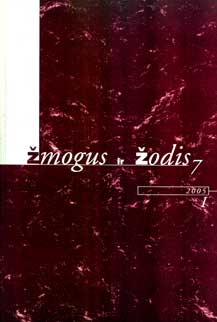Kalbėjimo aktų teorija ir poetika
Speech Act Theory and Poetics
Author(s): Izolda GenienėSubject(s): Language and Literature Studies
Published by: Vytauto Didžiojo Universitetas
Keywords: illocutionary and perlocutionary speech acts; the context ofthe real andpoetic (fictional) discourse; functions of illocutionary and perlocutionary acts in discourse
Summary/Abstract: The specificity of illocutionary and perlocutionary speech acts in a literary work is conditioned by the indirect relations of the speaker (writer) and the listener (reader) in their double projection towards the fictional (literary) and the real world contexts. The differences lie in the nature of two sides of perlocutionary acts in the real and in the poetical (literary) fictional discourse, namely, in the intentions of utterances and their results. This is connected with the features of the fictional discourse, which presents a great chain of narration: the real (biographical) author - the writer (the creator) the speaker - the narrator - the narratee/ addressee - the implied reader - the real reader - the ideal reader. As all the agents (members) of the chain have their own perception of the world, the basic relationship, which is raaterialized in the text between the writer/speaker - the text - the addressee/reader displays a polylogue, a polyphony of voices which are open to ambiguities, different points of view and inteipretations. In different literary genres (poetry, prose, and drama), in spite of their structural and compositional differences, the illocutionary and the perlocutionary acts aim at cognition of the human and the world not through factual information but through aesthetico cognitive impact. The role of the language is foregrounded. The creator (writer) tries to probe deeper into the multiple semantic powers of the word, exploits ils ambiguities, plays with violations of the maxims of quality, quantity, relevance, posing an intellectual task for the reader to decode the complexities of meaning. The more the reader is prepared to meet the linguistc and stylistc challenges of illocutionary and perlocutionary acts, the better the felicity conditions (succesful understanding of the senses in fictional discourse) are achieved.
Journal: Žmogus ir žodis
- Issue Year: 07/2005
- Issue No: 1
- Page Range: 9-12
- Page Count: 4
- Language: Lithuanian

